By Margarita Díaz-Andreu, Universitat de Barcelona/ICREA and María Gabriela Navas Perrone, Universitat de Barcelona
The main objective of the the Deep Cities Project Barcelona workshop, Integrating Society Through Evaluation Processes, was to discuss and propose tools for participatory processes designed to integrate society into heritage management projects. It was the fourth and final workshop organised by the Deep Cities project. It aimed at working with evaluative dynamics from a participatory point of view, given that heritage projects are often shaped by expert stakeholders and their social inclusion strategies do not always consider local voices. To mitigate this authoritative perspective, we proposed to reflect on strategies that encourage citizen participation in the evaluation of academic and administrative actions. This meeting was also intended to be a forum for reflection on the review and development of a series of recommendations and as a guide to good practice when working with different stakeholders, while emphasising urban heritage policies.
The workshop was held on 8 and 9 September 2022 in the two neighbourhoods chosen by the Barcelona team as their case study areas: the municipality of L’Hospitalet de Llobregat and the Sant Andreu district in Barcelona. On 8 September we met in the Can Riera building of the L’Hospitalet Museum of History and on 9 September we convened at Can Fonanet on the former Fabra i Coats factory site in Barcelona. The collaborating entities were: Deep Cities, the University of Barcelona, the Grup d’Arqueologia Pública i Patrimoni (GAPP), the Museu de l´Hospitalet and Kultura, Ideas y estrategias para el patrimonio.
The meeting was opened on September 8 by the Deputy mayor of Education, Innovation and Culture, David Quirós, of the L’Hospitalet City Council, who welcomed some twenty professionals from different European cities and local institutions. Subsequently, the workshop programme and objectives were presented by Margarita Díaz-Andreu (ICREA-University of Barcelona), followed by an introduction to the theme of heritage in L’Hospitalet by the Director of the Museum of L’Hospitalet, Josep Maria Solias. Next, María Gabriela Navas Perrone (Postdoctoral Researcher at the University of Barcelona) offered some reflections on the need to think about guidelines to conduct participatory processes that take into account the contradictions inherent in the dynamics of urban commodification.

The second part of the first day’s morning session was taken up by focus groups held to discuss the toolbox proposed by the Deep Cities project to facilitate decision-making in heritage management. Each focus group consisted of members of the Deep Cities project team and various invited specialists and researchers from the academic and heritage management fields: Josep Maria Solias (L´Hospitalet History Museum), Antoni Nicolau (Kultura, Ideas y Estrategias para el Patrimonio, S.L.), Marta Flórez (Kultura, Trinitat Uneix, Researcher attached to the Institut Català d’Arqueologia Clàssica), Iolanda Marrasé (Can Fontanet); Selene Frascella (University of Barcelona), Anna Villarroya (Centre de Cultura en Informació, Comunicació i Cultura (CRICC)/University of Barcelona); and Ted Grevstad-Nordbrock (Iowa State University). The suggestions, comments and conclusions presented by each focus group were very useful for improving this methodological tool with a view to achieving sustainable urban strategies through heritage preservation processes.
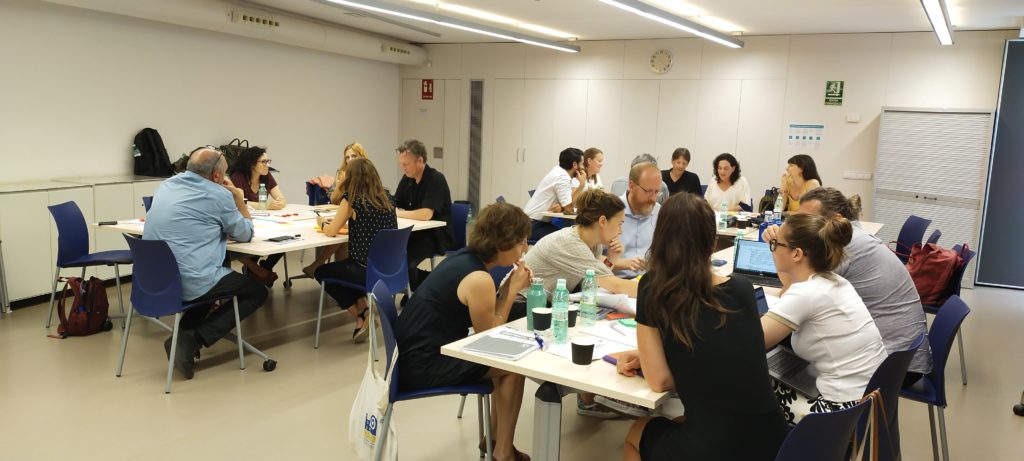
Barcelona, 8 September, 2022. Photo: Margarita Díaz-Andreu.

Barcelona, 8 September, 2022. Photo: María Gabriela Navas Perrone.
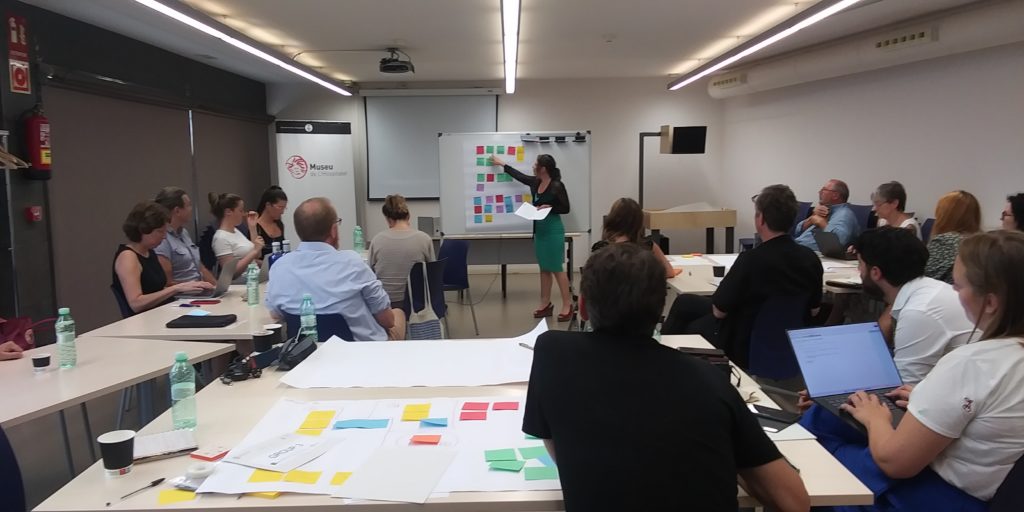
Deep Cities project partners. Workshop on managment toolbox (presentation of the conclusions of each focus group). Barcelona, 8 September, 2022. Photo: María Gabriela Navas Perrone.
Finally, to conclude the day, participants were taken on a guided tour of the architectural heritage of L’Hospitalet, beginning at Can Riera and ending at Santa Eulàlia de Provençana church.
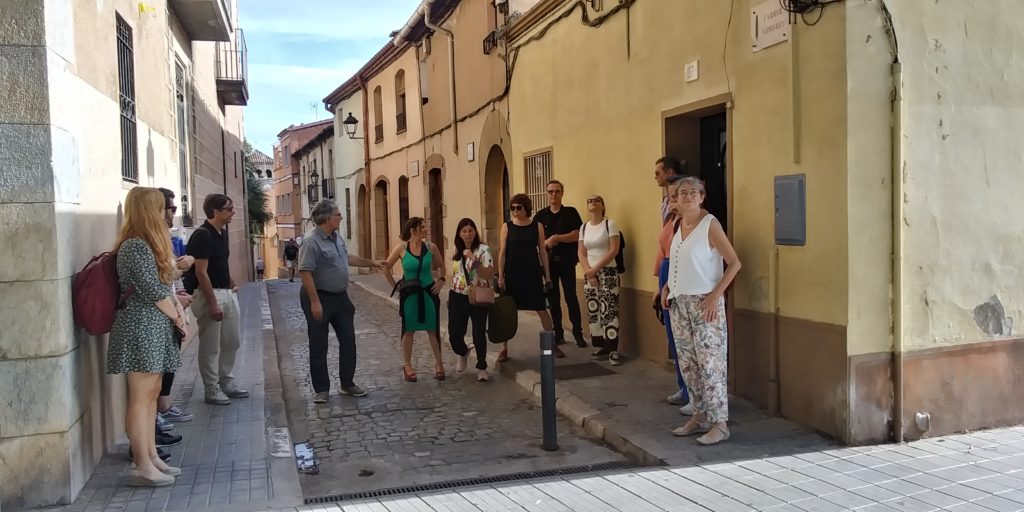
Barcelona, 8 September, 2022. Photo: María Gabriela Navas Perrone.

Barcelona, 8 September, 2022. Photo: Ted Grevstad-Nordbrock.
The second day of the workshop on 9 September was held at Can Fontanet on the Fabra i Coats site. The opening talk was given by Ana Pastor Pérez (Margarita Salas postdoctoral researcher at the University of Barcelona) on the decoding of the social values of urban transformations in Fabra i Coats. Next, Iolanda Marrasé (Coordinator of Can Fontanet) shared various reflections on how to bring heritage preservation closer to the neighbourhood and the citizenry. Subsequently, Brian Rosa (Marie Skłodowska-Curie Research Fellow in Urban Geography, Pompeu Fabra University) presented an analysis of the transformation of the post-industrial landscape in Barcelona, highlighting the symbolic value of the former industrial chimneys preserved as a heritage legacy that is very characteristic of the city. To close the morning session, Pere Fernández (Friends of Fabra i Coats) took the participants on a guided walk around the former Fabra i Coats factory, whose facilities and manufacturing machinery are considered to be some of the best preserved in Europe.

Barcelona, 8 September, 2022. Photo: Ana Pastor Pérez

Barcelona, 9 September, 2022. Photo: Anonymous.
In the afternoon, an internal discussion session was held among the members of the Deep Cities team. The subject was the public policy recommendations that will be proposed based on the main findings identified in the case studies of Norway, the United Kingdom, Italy and Spain. The objective of these recommendations is to contribute to the European Union’s conservation policy through sustainable heritage conservation strategies based on the social value of urban transformations.
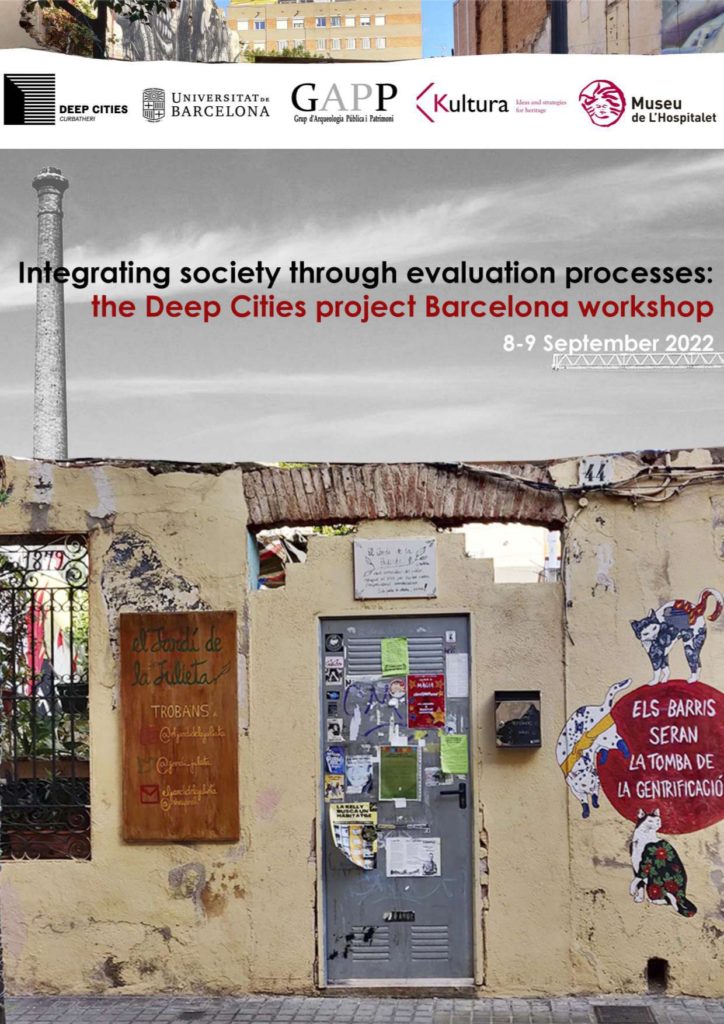
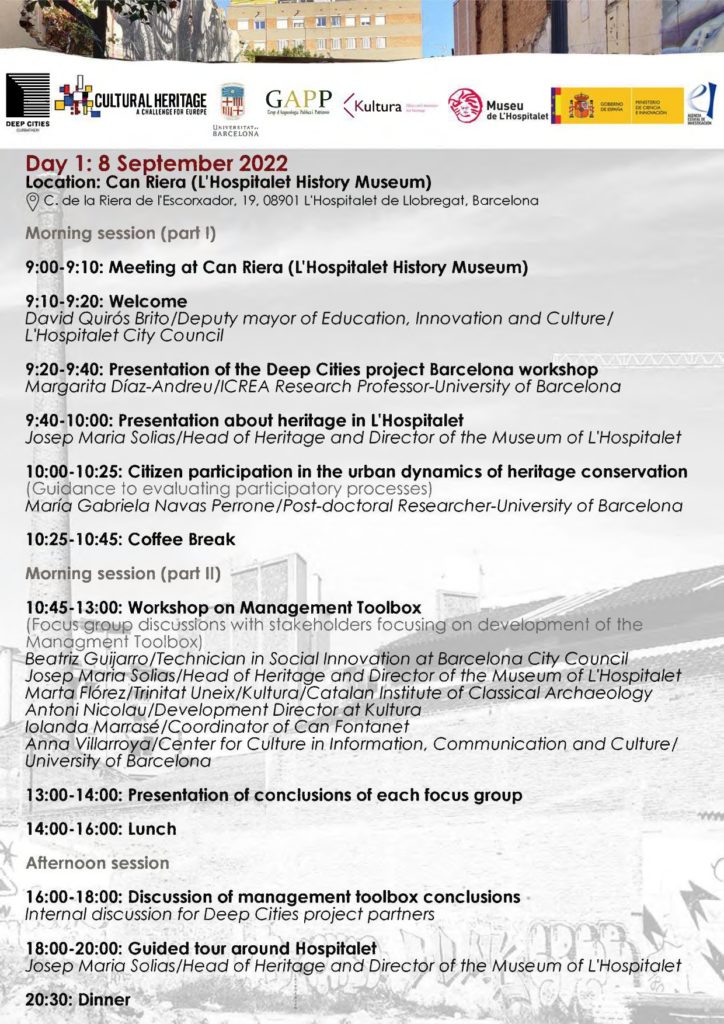
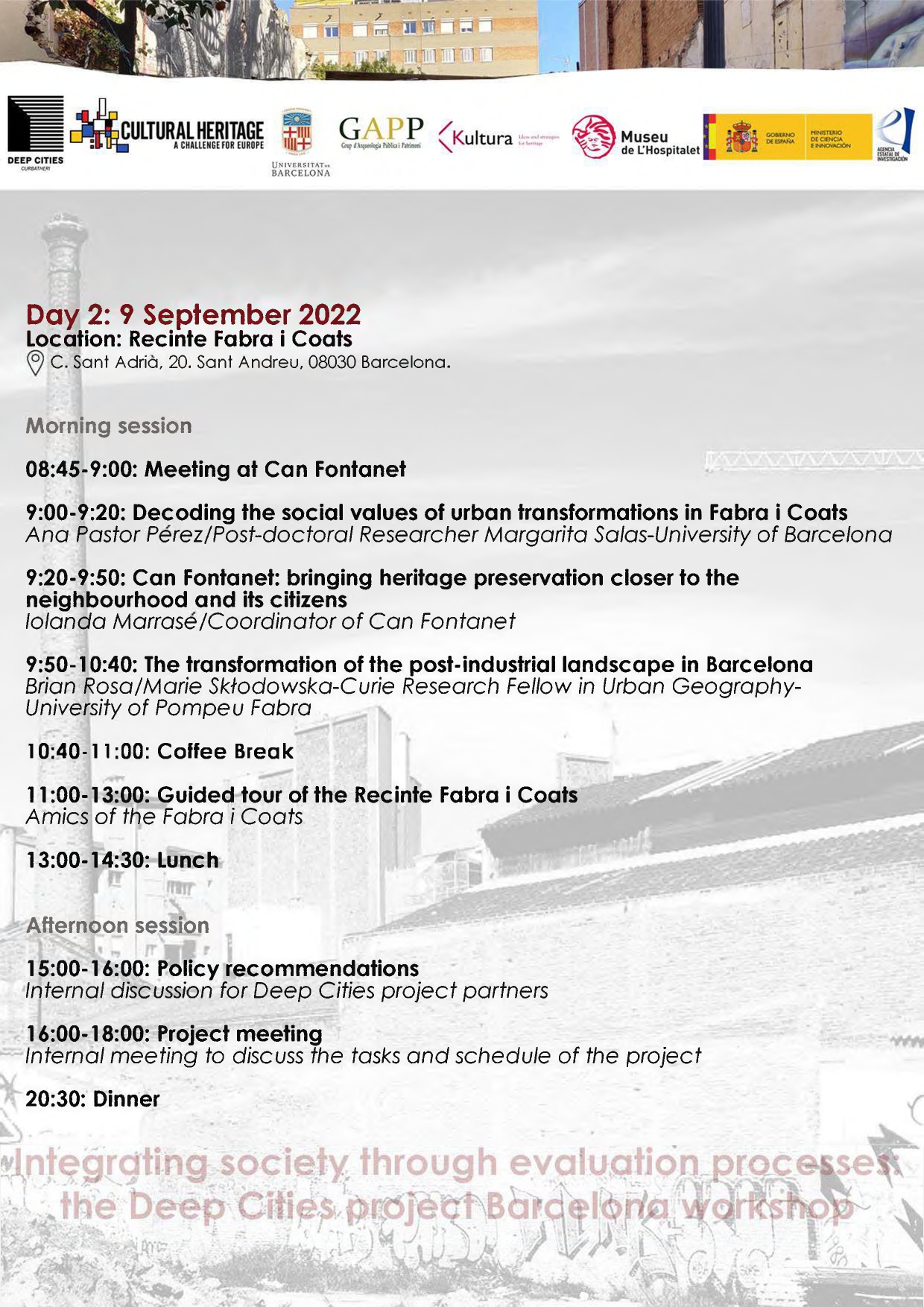
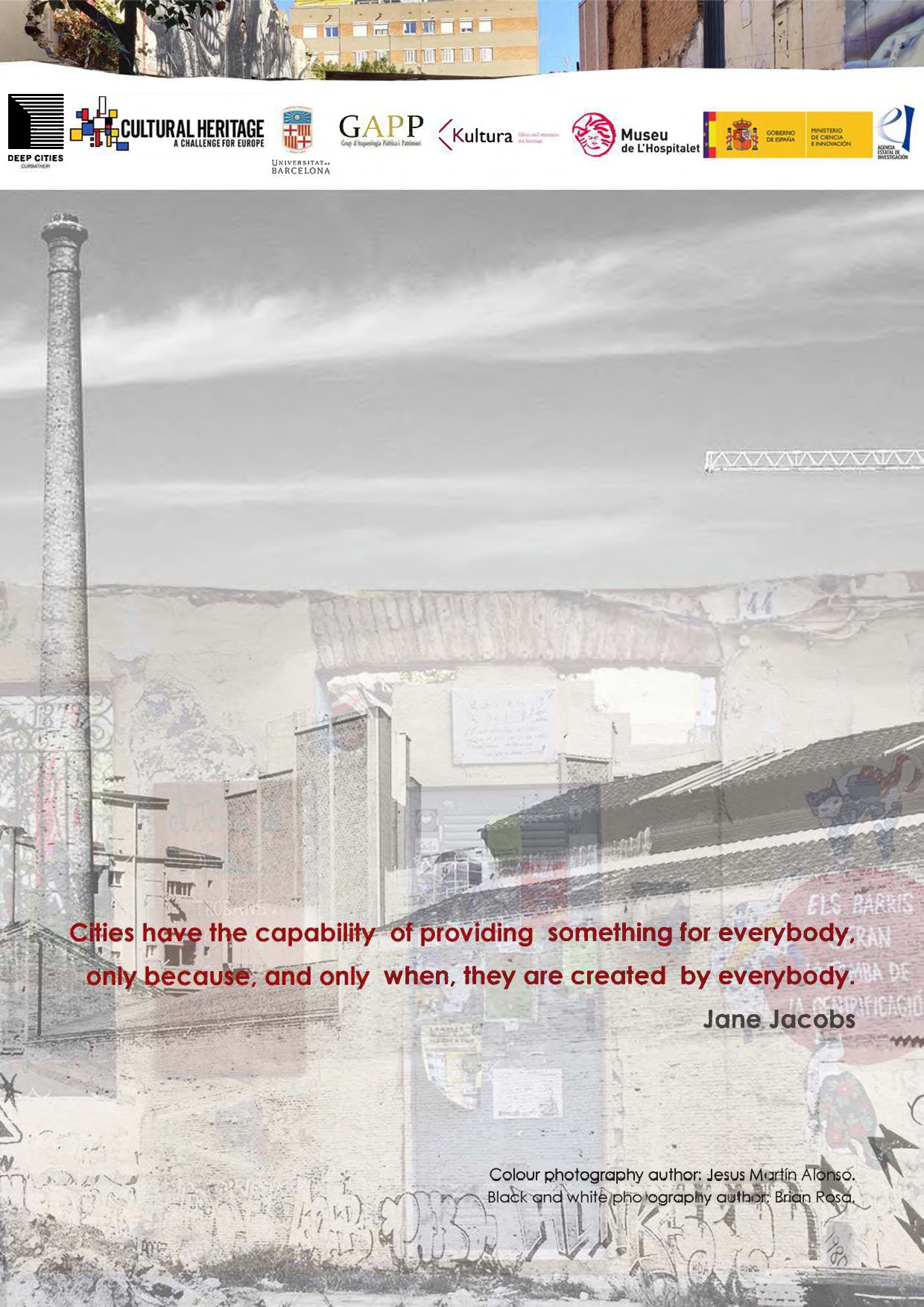
Programme of the Deep Cities project workshop in Barcelona
Poster by: María Gabriela Navas Perrone. Colour photography: Jesús Martín Alonso / Black and white photography: Brian Rosa
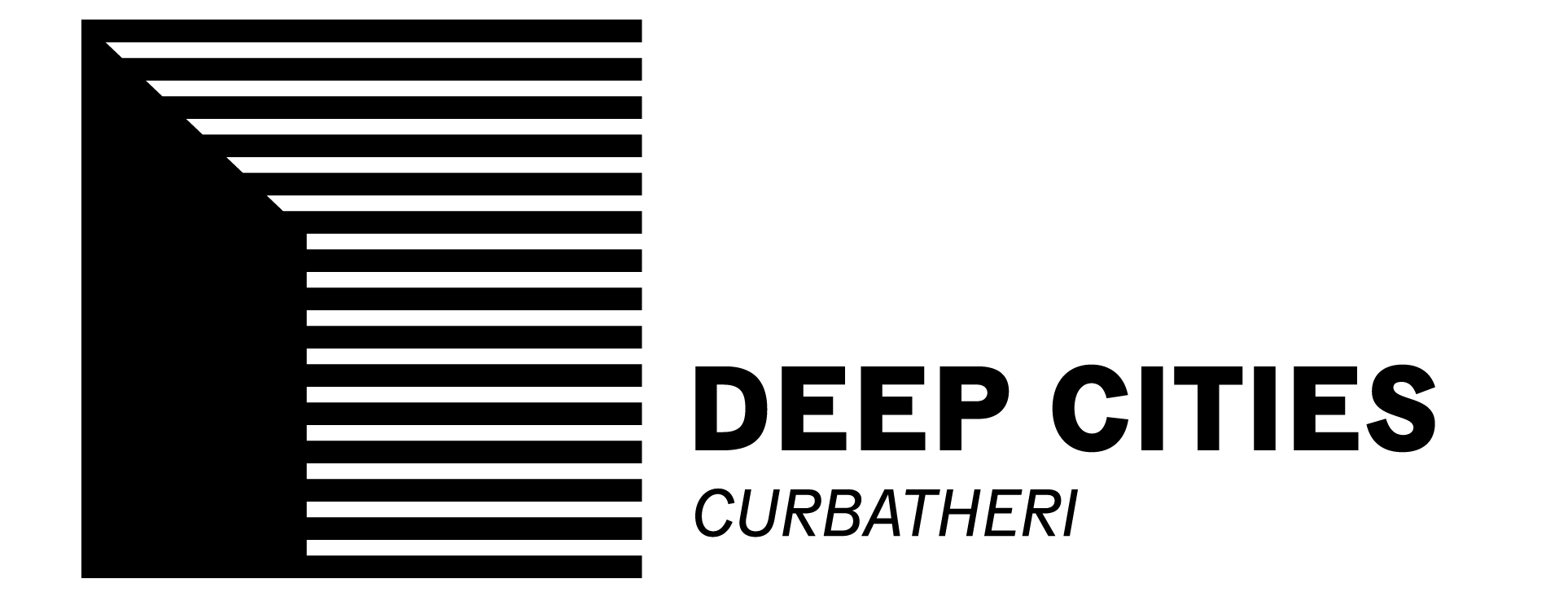
Leave a Reply